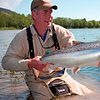Disclosure: Some posts contain affiliate links, which earn us a commission if you make a purchase through them. Positive Fishing © participates in various affiliate networks including the Amazon Services LLC Associates Program.
Freshwater fishing is one of the most popular sports in England, and no matter where you are in the 48 counties, you’re never far from a lake or a river and have a chance of catching some great fish.
Whilst some will say that it’s not as exciting as being on the flats of Seychelles or in the mountains of Patagonia, it has a quaint charm that is incredibly relaxing.
The amazing countryside and easy access to fish make it a fantastic experience. Whether you are strolling along the banks of a chalk stream or getting lost in your mind by casting into a beautiful lake, the stress of everyday life disappears!
That being said, it does offer a diverse range of fish species, and you can do it in some spectacular landscapes, too.
Having grown up fishing in England and with around 30 years of it under my belt, I will showcase the best freshwater fishing England offers.
In this article, I will introduce you to the following:
- What are the freshwater fish to catch in England?
- Where to catch them and how to catch them.
- Who are the best companies to book your fishing trip with?
Freshwater Fish To Catch In England
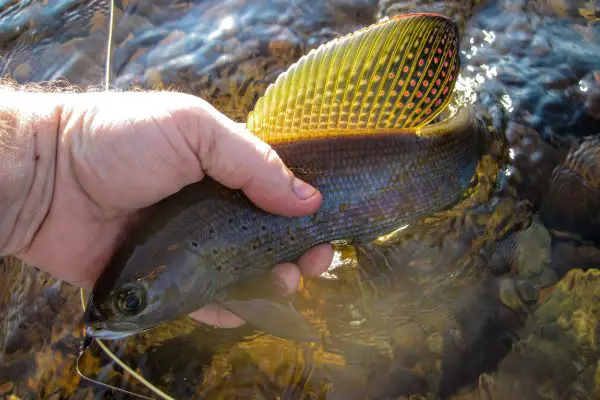
Between the freshwater lakes and rivers of England, you can target a diverse list of fish species depending on your mood and what you like to fish for.
Many waters up and down the country have several prized freshwater fish you can target. Whether you’re a general coarse angler, a spin fisherman, or a fly fisherman, you’ll be spoilt for choice regarding which fish to target on any given day.
- Salmon
- Sea Trout
- Brown Trout
- Rainbow Trout
- Grayling
- Pike
- Carp – common, mirror, grass, leather etc
- Barbel
- Chub
- Zander
- Tench
I have left off quite a few course species from the list, such as bream and roach, as they are not so popular and outside the top fish to catch in England.
Where To Go Fishing In England
Knowing where to go for freshwater fishing in England is easier than finding the sea fishing spots around the coasts. More information on all the key rivers and lakes is widely available through social media links and angling club websites.
I have fished all the places listed below, and they are excellent options for the particular species they hold.
River Test, Hampshire
If you’re a fly fisherman, chances are you would have heard of the River Test in Hampshire, as it’s probably the most famous river in England and one of the most famous in the fly fishing world.
The River Test is a chalk stream with a limestone bottom and is spring-fed, creating crystal-clear waters. Walking along the banks of the Test, you can see every single trout and grayling in the river sitting on the bottom, picking off food as it flows past.
The crystal clear waters allow you to sight fish for grayling and brown trout, meaning you don’t cast until you see a fish. This level of intensity makes the fishing extremely exciting, especially when you see a fish inhale your fly.
The Anton, Dever, and Dun tributaries flow into the Test at points through the 40-mile length.
The Test is a fly fishing only river, and it’s pretty expensive, but it’s such an iconic river that everyone should fish it once in their lives.
River Itchen, Hampshire
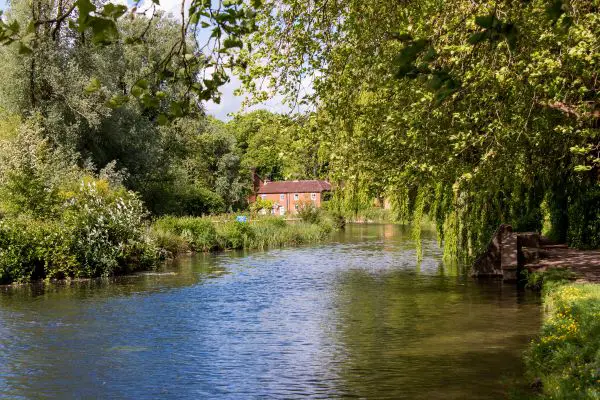
The River Itchen is another chalk stream in Hampshire and is probably England’s second most famous river. Like the Test, the River Itchen also has crystal-clear waters and is home to grayling and trout, which you can sight fish for.
The Itchen is 26 miles long and converges with the Test at the tidal estuary of Southampton Water.
You can only fish on the Itchen with a fly rod, and the fishing is just as good as on the River Test, but it is a little more affordable.
River Wye, Herefordshire
The River Wye flows along the border between England and Wales in the county of Herefordshire and through the Wye Valley, an area of outstanding natural beauty.
The Wye is quite a special place to go fishing in England as it is home to many of the top freshwater fish to catch that I mentioned in the list above. You can target salmon, sea trout, brown trout, barbel, and pike in the same river, which can lead to quite an amazing day of fishing!
Another awesome thing about the River Wye is that the fishing isn’t limited to fly rods only, meaning you can use spinning rods to cast lures and general coarse fish with natural baits.
River Ure, Yorkshire
The River Ure sits in Yorkshire in northern England and is a stunning river with waterfalls that run through a beautiful forest. The river is probably one of the prettiest rivers in England, and you can find some big brown trout, salmon, and grayling swimming inside it.
Most of the fishing along the Ure can only be done with a fly rod in hand, and it has some excellent dry fly hatches during the season, which shouldn’t be missed.
Rutland Water, Leicestershire
Rutland Water is a huge reservoir in the East Midlands of central England. It is one of the best fishing lakes in England and is home to huge trout up to 15 lbs, pike up to 40 lbs, and big predator fish such as zander.
You can easily book guides for the day, too, which is highly recommended as finding a good fishing spot on such a huge lake with limited knowledge of fishing there before is a huge challenge.
Lake Windermere, Cumbria
Lake Windermere is a huge body of water, at 14.8 sq km, 11 miles (18 km) long, and 1 mile (1.5km) at its widest point. This is England’s largest lake and the most visited for all types of sport.
Not only is it the largest natural lake in England, but it is also an extremely beautiful part of the country. It’s known for its summer and holiday homes dotted around the shore and is located in the famous Lake District; it does get busy with vacationers, especially through the summer.
The main species are large pike, perch, eels, and trout. The rare Arctic charr can also be found in Windermere. Salmon and sea trout also migrate through the lake each year.
The North Basin is more popular than the South Basin area and, as a result, is generally more productive. Most bankside is private land, so boats are used primarily for fishing. However, plenty of trees and features are under the water to which fish are drawn to find food and cover.
Tip: Lake Windemere is 250ft deep (67 meters) and holds 300 billion liters of water!
River Dove, Derbyshire
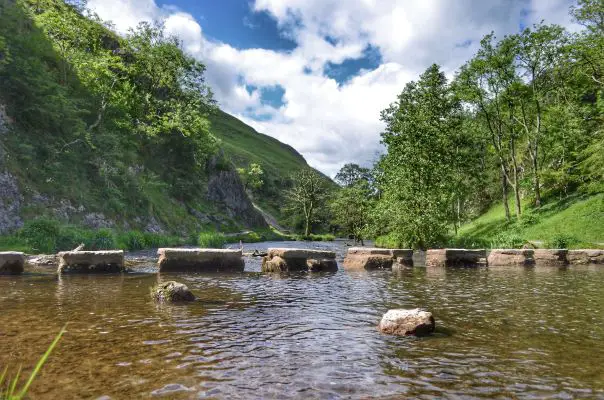
The River Dove is a limestone river that rises at Buxton and flows through the beautiful Peak District. The water cutting through the limestone has formed a fantastic meandering stream through the hills.
The Dove is a famous fishing area due to the 350-year-old book “Izaak Walton’s Compleat Angler” references. It is renowned for its prolific general coarse fishing, grayling, and trout. The river is 45 miles in length,
Dry fly fishing for brown trout (around the Beresford Dale area) is the best method in these gorgeous fast sections, long glides, tumbling weirs, and deep pools. If you plan to fish for barbel and chub, the area between Hutton and Tutbury is one of the best locations.
Sywell Reservoir, Northamptonshire
Sywell has been known as one of England’s renowned tench fishing locations for many years. It is located within the 67 acres of Sywell Country Park.
Double figure tench using the right tactics are the target fish at Sywell Reservoir; the famed TV angler John Wilson filmed many “Go Fishing” TV shows at this venue in the 1990s.
Other than tench, this lake has plenty of pike over 30 lbs. The most popular area to fish is the dam wall.
When To Go Fishing In England
A lot of the freshwater fishing in England is closed between March 15th and June 15th (inclusive) as this is when species like trout tend to spawn and are left alone to reproduce. This regulation mainly impacts the rivers, lakes, and canals, which are generally open all year.
As winter draws in around November, fishing becomes less popular due to the weather, which isn’t particularly pleasant, especially in the country’s Northern areas. Although you can still do general coarse fishing, you will need to ensure you wear a set of winter clothing to keep warm and dry.
The best time to go fishing in England is between the months of April and October. The rivers and lakes are teeming with hungry trout, grayling, barbel, and pike trying to get fat after winter.
If you’re a fly fisherman, it pays to time your fishing with the mayfly hatch in May when trout and grayling go wild, sipping these insects off the water’s surface.
Salmon and sea trout run into England’s rivers between April and October, and the seas typically are much calmer to fish on.
Best Ways Of Catching Fish In England
If you’re fishing in the rivers and lakes of England, you can do fly fishing for trout, grayling, and salmon.
Spinning gear for predators such as pike, zander, and perch with lures is the most common method, especially during the summer and autumn. Using live and dead baits (where allowed) for predator fish excels in the winter months.
If you are more of a general angler, either ledgering on the bottom or float fishing will always produce fish in the lakes and reservoirs.
As I mentioned above, some of the waters are strictly fly fishing only, and this is usually the case when going after sea trout, salmon, trout, and grayling.
How To Book Your Fishing Trip To England
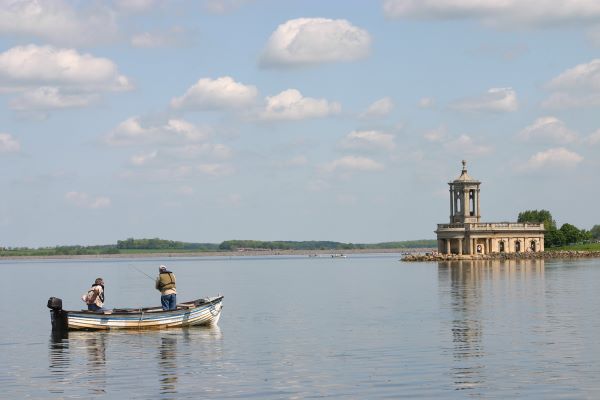
To book fly fishing on any of the rivers I mentioned above, your best bet is to contact Aardvark McLeod. They specialize in guided fly fishing over multiple locations in the country and the rest of the world and will organize everything for you.
If you want to go and fish on Rutland Water, you should contact Discover Rutland, who will organize a boat, guide, and accommodation for you.
If you want to try fly fishing in the English chalk stream rivers, I strongly suggest contacting fishing breaks. They organize great trips to many top streams in the country and can also organize tuition, family fishing, and fishing cottage vacations. Chalk stream fishing can be expensive due to its exclusivity, so spend some time reaching the specific areas or rivers you plan to fish.
England’s Fishing Regulations
If you plan freshwater fishing in England, you must have a valid fishing rod license.
You can buy a day, week, or year-long license to fish for non-migratory trout and all freshwater fish or an alternative license for salmon, sea trout, non-migratory trout and all freshwater fish. It should be noted that this allows you to use a rod to catch fish; it does not allow the taking of fish above limits such as size and quantity.
Check out my article on buying a fishing license in the UK with a step-by-step guide that explains how and where to get your license.
Do I Need A Permit To Freshwater Fish?
In England, membership permits are required to fish in many spots, especially lakes and rivers. You should always check before you go what the rules and regulations are for the specific water you would like to fish in.
Many private lakes require a small payment for a day ticket (typically costing around £10), which can be purchased at the venue before fishing.
Fishing on syndicate lakes requires a yearly membership and is more exclusive, usually with long waiting lists. Joining an angling club is a much easier and more affordable option.
Public access free to fish areas exists in most areas, but these are generally not the areas where large fish are found and are also not prolific. Finding free fishing can be challenging as the areas are not generally advertised. You can ask the local tackle shop for information if you are unsure.
Casting Out
Thanks for reading my article; I hope you found it useful and are planning your fishing trip to England.
England really does have a lot of fishing to offer, and there is nothing better than having a great pint of English ale in a pub after a long day on the water.
You can read more about fishing around the coasts of England if you prefer the saltwater beach and boat options.
- Top Tips For Fishing With Feathers - January 15, 2025
- How To Fish For Flounders: Tips, Rigs, & Baits - March 27, 2024
- Fortis Wraps Fishing Sunglasses: The Affordable Option For Anglers - January 25, 2024

